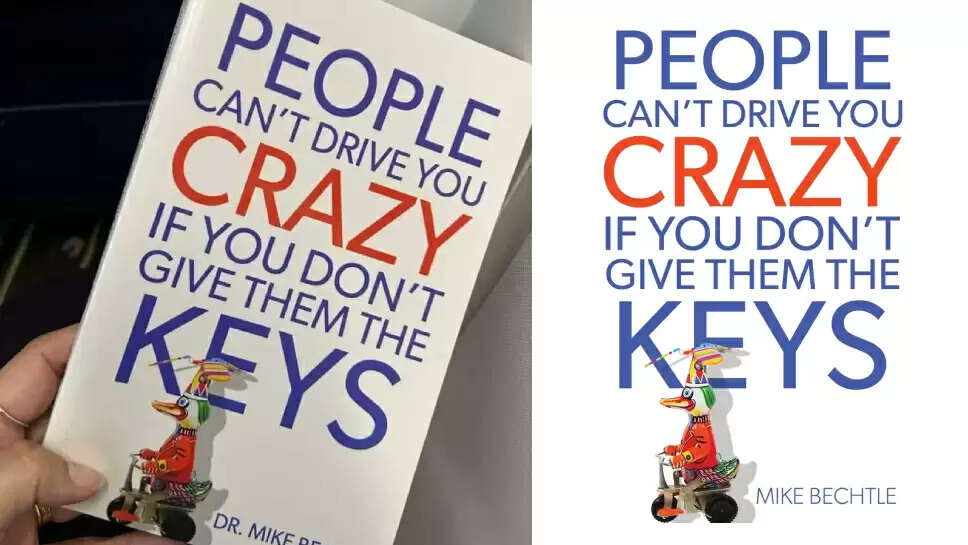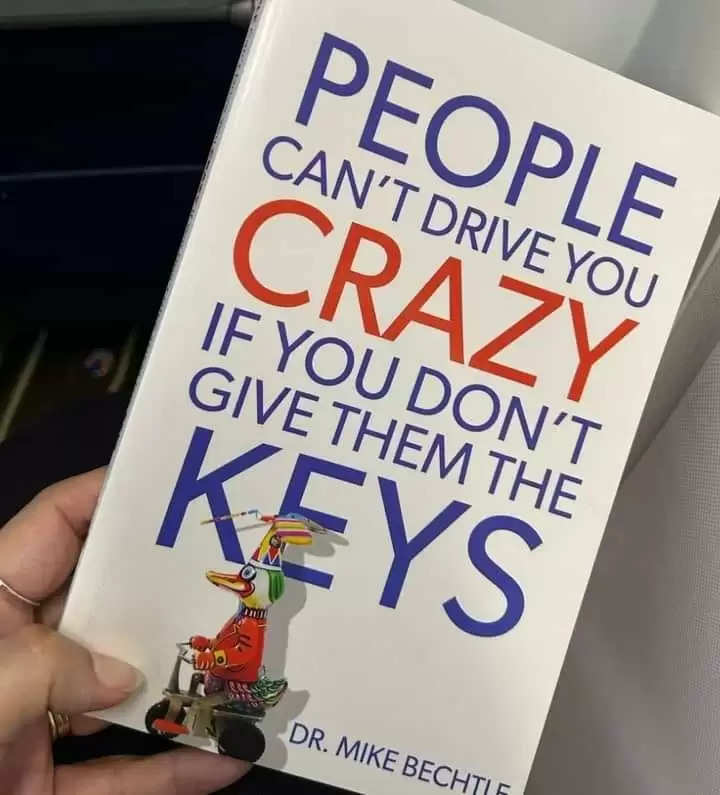10 lessons from "People Can't Drive You Crazy If You Don't Give Them the Keys" by Mike Bechtle

People Can't Drive You Crazy If You Don't Give Them the Keys, by Mike Bechtle, is a great book full of useful tips on how to deal with difficult people. It's all about being in charge of how you react to other people and making sure that their actions don't hurt your health. Here are ten important lessons from the book, written in a casual style:
1. Take Responsibility for Your Reactions:
One of the core messages of Bechtle’s book is that you are in charge of your own reactions. Imagine a situation where someone is deliberately trying to get under your skin. Instead of letting their provocations dictate your emotional state, recognize that you have the power to choose how you respond. This means you can remain calm and composed, no matter how much someone might try to rattle you. By taking responsibility for your own reactions, you protect your emotional peace and maintain control over your responses. This mindset shift can be incredibly liberating and empowering.
2. Set Boundaries:
Boundaries are like the invisible lines you draw to protect yourself. Setting clear and healthy boundaries means communicating what behavior you find acceptable and what you don’t. It’s about standing up for yourself and ensuring that others respect your limits. For instance, if someone constantly interrupts you during conversations, let them know that you need to finish your thoughts before they speak. Boundaries are crucial for preserving your emotional well-being and ensuring that others don’t overstep and take advantage of you.
3. Don’t Personalize Others’ Behavior:
It’s easy to take things personally, especially when someone’s behavior seems directed at you. However, Bechtle encourages us to understand that people’s actions are often more about their own issues than about us. If someone is grumpy or rude, it might reflect their own stress or problems rather than anything about you. By detaching emotionally from their behavior, you can keep your peace of mind intact and not let their issues become your burden.
4. Communicate Clearly and Assertively:
Communication is key to avoiding misunderstandings and conflicts. Bechtle advises practicing assertive communication, which means expressing your needs and feelings honestly and directly without being aggressive. For example, if you’re feeling overwhelmed by someone’s demands, calmly stating, “I need some time to complete this task,” can be much more effective than either bottling up your frustration or snapping at them. Clear and assertive communication helps ensure that your voice is heard and can prevent many potential conflicts.
5. Manage Your Expectations:
One of the biggest sources of frustration is unrealistic expectations of others. Bechtle suggests adjusting your expectations and recognizing that people have their own limitations. Not everyone will meet your standards or behave as you wish. By accepting that people are imperfect and may not always live up to your expectations, you can reduce the disappointment and frustration that often comes from expecting too much.
6. Develop Emotional Resilience:
Building emotional resilience is all about strengthening your ability to handle stress and difficult situations. This can be achieved through practices like self-care, mindfulness, and stress management. For instance, taking time for yourself, engaging in activities you enjoy, and using relaxation techniques can all help in maintaining a resilient mindset. When you’re emotionally resilient, you’re better equipped to navigate challenging interactions without feeling overwhelmed.
7. Practice Empathy:
Empathy involves trying to understand things from another person’s perspective. Bechtle highlights that when you practice empathy, you can gain insight into why someone might be acting a certain way. For example, if a colleague is being particularly uncooperative, considering that they might be under pressure or dealing with personal issues can help you approach the situation with more compassion. Empathy not only helps in reducing conflict but also strengthens relationships by fostering understanding and respect.
8. Detach with Love:
Detaching with love means maintaining your emotional equilibrium while still showing kindness and respect. It’s about not letting someone’s behavior disrupt your inner peace, yet not cutting them off completely. For instance, if a family member is consistently negative, you might choose to limit your interactions to protect your own mental health, but still treat them with care and respect. This approach allows you to care for someone without allowing their behavior to negatively impact you.
9. Focus on Solutions, Not Problems:
Instead of dwelling on the difficulties posed by difficult people, Bechtle encourages focusing on finding solutions. This shift in mindset from being a passive victim of circumstances to being an active problem-solver can be incredibly empowering. For example, if you’re dealing with a difficult team member, instead of just complaining about their behavior, look for ways to address the issue constructively. This proactive approach can lead to more positive outcomes and less frustration.
10. Seek Support When Needed:
Finally, Bechtle underscores the importance of seeking support. If you’re struggling with particularly challenging individuals, don’t hesitate to reach out to friends, family, or a professional counselor. Having a support system can offer you valuable perspective, advice, and encouragement. Sometimes just talking things through with someone who understands can make a big difference in how you handle difficult situations.
You can handle tough situations and keep your mental health in good shape by following these lessons from People Can't Drive You Crazy If You Don't Give Them the Keys. By following these rules, you can stay calm, set healthy limits, and build better relationships with other people.

Book: https://amzn.to/3WPR8zl
--
-- Class Dismissed --
You Might Also Like: 10 Essential Life Lessons from Arnold Schwarzenegger’s "Be Useful"
